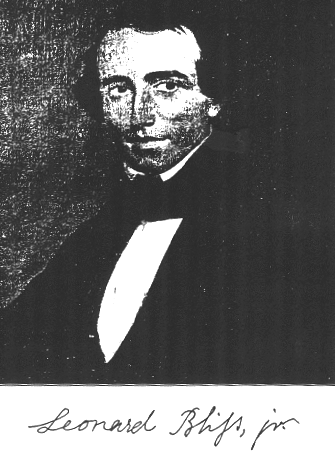|
Leonard Bliss |
 |
|
BLISS, LEONARD, Jr., was the eldest son of Leonard and Lydia (Talbot) Bliss and grandson of Dr. James Bliss of Rehoboth and Hannah (Guild) Bliss of Attleborough. His mother was a daughter of Josiah Talbot of Dighton. He was born Dec. 12, 1811, probably at Savoy, Mass., his parents removing about this time to Truxton, N.Y. He was a bright, active boy and was proud of having won the first place in a spelling match at the age of twelve. When he was fifteen he was converted in a revival and joined the Congregational Church at Truxton. In 1828, he came with his parents to Rehoboth to live. Dr. James Bliss, his grandfather, owned a large farm just west of the Village Cemetery. Oppressed by the cares of his profession and the weight of increasing years, he desired his son to take charge of the farm. This lie did until the Doctor’s death in 1834, when he moved to the adjoining farm, afterwards owned by Dr. Royal Carpenter and his son De Witt. The house was built by Dr. Bliss for his son Leonard in 1815. Leonard Jr., being ambitious for an education and encouraged by his parents and his pastor, Rev. Thomas Vernon, fitted for college at Mr. Colton’s Academy (Mount Pleasant), at Amherst in 1830, where he met and became intimate with Elias Nason, who afterwards wrote "The Gazetter of Massachusetts." They entered Brown University together as room-mates in 1831. Mr. Nason writes of his old chum: "He was a great leader and his brain was full of literary schemes. His scholarship was good, but he had rather spend time in reading and writing poetry than over the pages of Le Croix’s Algebra." Straitened for means, young Bliss began in his Junior year to write the History of Rehoboth. He found the task difficult; his health became impaired, and he was unable to return to college to graduate with his class.. Consumptive tendencies~ developed and he suffered from a hemorrhage of the lungs. in the summer of 1834, having taught the previous winter at Bridgewater, Dr. Parsons, his physician, said he "must go home to die." He still worked on his history, and in August of that year he had two hundred and sixty-five subscribers for it. The book was published in 1836, and was well received, but like town histories generally, it brought its author more fame than money. Having in a measure regained his health, he taught school at Plymouth, Mass., and other places; then bought and edited for a time the Boston Republican. He contributed articles to the North American Review and The Christian Examiner. His fiancée was Miss Caroline M. Carpenter, daughter of Lemuel C. and Lucinda (Wheaton) Carpenter of Seekonk, daughter of Capt. Joseph Wheaton of Rehoboth. Their engagement was destined to a sad ending through his untimely death by the bullet of a murderer. In 1837, Mr. Bliss left Rehoboth with his brother, afterwards the Rev. James Bliss of Bloomington, Ill. At Louisville he met George D. Prentice, editor of the Louisville Journal, and assisted him on the paper. He was chosen professor of history and general literature in the Louisville Institute, just then started; but this enterprise failed for lack of endowment, and in 1840 he became editor of the Louisville Literary News Letter. Bliss wrote several books, including an English grammar. His life was one of intense activity, his greatest incentive being, as he said, not "the love of fame, but the love of achievement." On reporting for the Louisville Journal a political speech made by Henry C. Pope, he was hunted through the streets by Godfrey Pope, a cousin of the latter, and shot down as he was coming out of the Gait house with Mr. Dinneford the actor. This shameful murder by a hot-blooded Southerner occurred on the 28th of September, 1842. Pope was tried for murder, but having money and influence was acquitted on the ground of self-defense, as Mr. Bliss had a revolver in his pocket. After ten days of suffering he passed away, surrounded by scores of friends, evidencing forgiveness to all and hope in God. He was followed to the grave by three hundred young men as personal friends and mourners. Godfrey Pope was practically ostracized. He enlisted in the Mexican war and was shot by a sentinel on failing to give the countersign. Henry C. Pope was killed in a duel. Truly "Evil shall hunt the violent man and overthrow him." The qualities of Mr. Bliss were of a high order. He was fond of poetry and held the pen of a ready writer. Elias Nason says of him: "He was sanguine in temperament and his imagination vivid. He read and wrote incessantly, and his writings, if collected, would fill many volumes. He gave lectures publicly on History, Archery, Temperance, etc. He corresponded with Jared Sparks, James Savage, and other distinguished men." No finer tribute can be paid to his memory than the following from the pen of his fiancée, Miss Carpenter: "He was ambitious and high-spirited, genial in temperament and generous to a fault; with a wealth of affection to mankind that led to his putting forth his best efforts for the uplifting of humanity." |